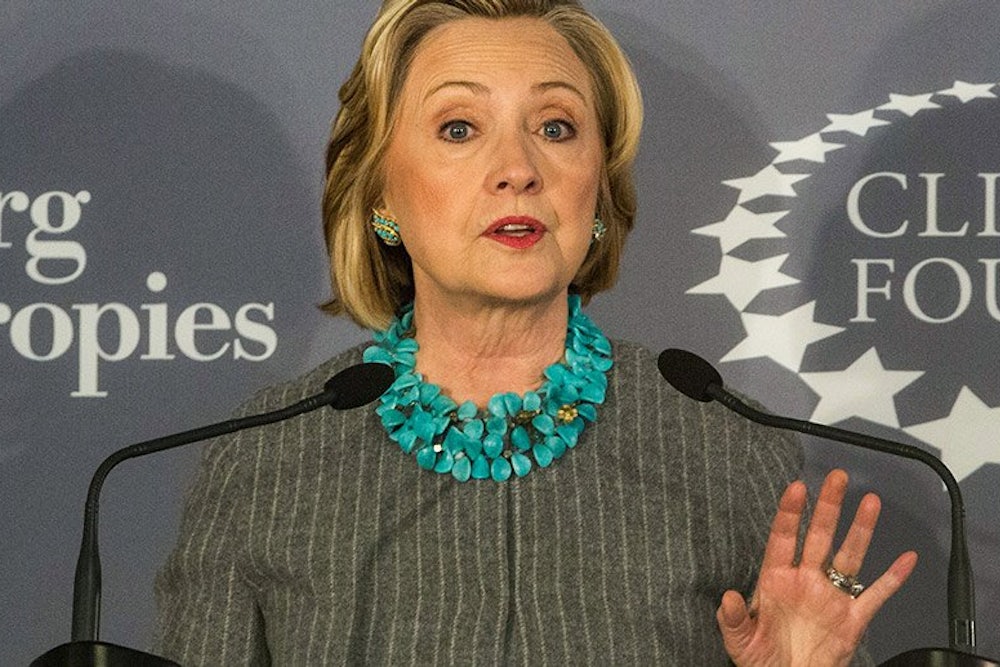"We could have had Hillary here, but we couldn't find a foreign nation to foot the bill," Senator Ted Cruz joked at the Conservative Political Action Conference (CPAC) in National Harbor, Maryland on Thursday. “Please explain why we should accept that the millions and millions of dollars that have flowed into the Clinton Foundation from foreign governments don't represent a conflict of interest,” said Carly Fiorina, the former CEO of Hewlett-Packard and a potential Republican presidential candidate.
If you haven’t heard these attacks on Hillary Clinton before, you can be forgiven. Last week, the Wall Street Journal and Washington Post published separate investigations into the foreign donations to the Clinton Foundation. Those reports have many people at CPAC concerned—and have opened a fertile new avenue of attack for Republican candidates against her.
“Although it can hardly be worse than compared to Obama, the latest breaking news is that she got money from Algeria,” said Hy Drusin, a 68-year-old conservative activist. “God knows what she’ll do if Israel is still around if she becomes president. That’s the first thing that comes to mind.” Kristopher Del Campo, a 25-year-old student at DePaul University, said what was on everyone’s mind. “She’s just lying and covering up a lot. I think it shows her lack of leadership.” Carol Batzel, a 63-year-old activist attending the event with her husband, agreed. “It means she is potentially compromising our nation’s security in the world because she is taking their money.”
The Clinton Foundation—now renamed the Bill, Hillary & Chelsea Clinton Foundation—has long accepted donations from foreign governments. That didn’t end when Clinton became Secretary of State. The Post’s Rosalind Helderman and Tom Hamburger reported that before Clinton became Secretary, the Foundation agreed to only accept donations from foreign countries that had previously donated. The goal was to ensure that there were no potential conflicts between those donations and Clinton’s duties as Secretary of State. For the most part, it fulfilled that goal. However, the Clinton Foundation did make one mistake when it accepted a $500,000 donation from Algeria for relief for Haiti after the earthquake in 2010.
But since Clinton left the State Department, the Foundation has continued to accept foreign donations. The Journal report, which was published last Wednesday, detailed those donations. The United Arab Emirates, Saudi Arabia, Oman, Australia and Germany all gave significant amounts to the Foundation in the past few years. The UAE, for instance, gave between $1 million and $5 million in 2014 alone, according to the Journal investigation.
How concerned should you be about these donations? That’s hard to know. No one is alleging that Clinton took a bribe or that these donations will influence her decision-making if she becomes president. But it’s at least a little disconcerting—and not only to conservatives—that the Foundation has received such large donations from countries that don’t always align themselves with U.S. policies. It’s not hard to imagine that voters will share those concerns.
Given that, it’s worth questioning why the Foundation has accepted those donations in recent years, particularly in 2014 with the 2016 cycle about to get going. The Foundation had to know that accepting foreign donations would generate negative coverage and would give Republicans an easy way to attack Hillary. The money has probably gone towards philanthropic purposes, and the Clinton camp said as much in their responses to both the Post and Journal articles. Presumably, though, Clinton believes she could better help millions of people—both inside and outside the United States—if she wins the presidency in 2016. Why put that at risk by accepting donations from countries like Saudi Arabia and UAE?
I don’t have an answer to that question—it could be that Clinton made a political mistake. After all, she has not always shown the best pre-campaign judgment. For instance, she continues to give paid speeches for hundreds of thousands of dollars; those speeches always garner a negative headline and add further fuel to the belief that Clinton is out of touch with ordinary Americans. And she doesn’t actually need the money: She paid off her campaign debt in 2013 and will have time to give paid speeches after her political career is over.
All of this is a clear sign that the vaunted Clinton political machine is overrated.
